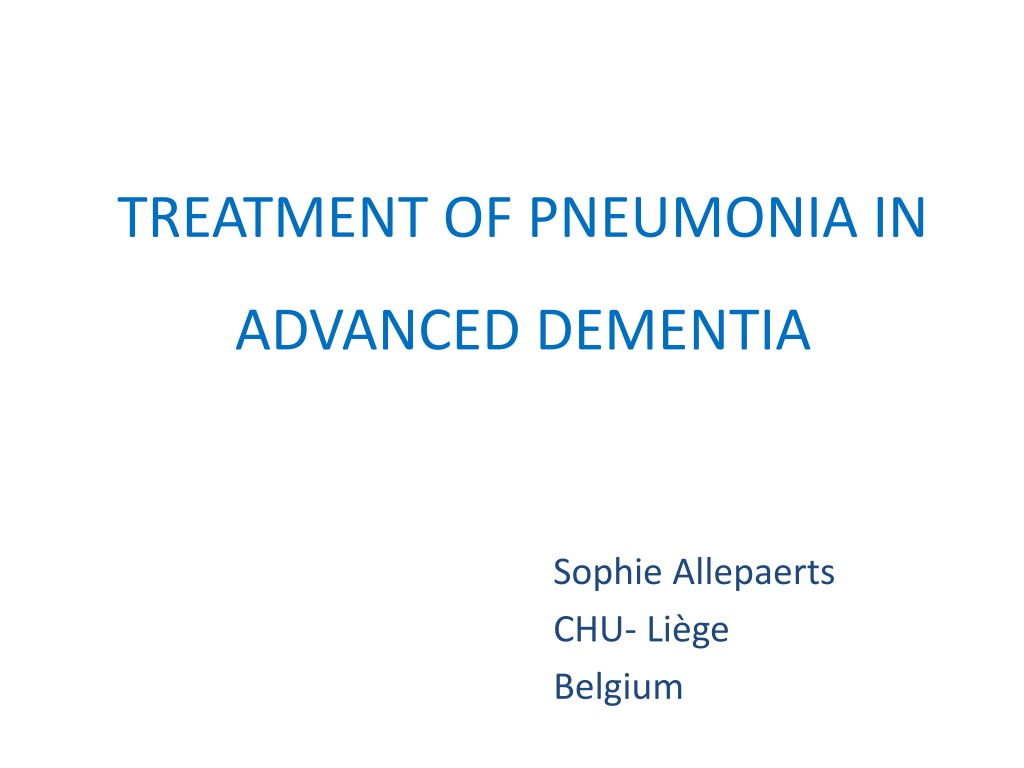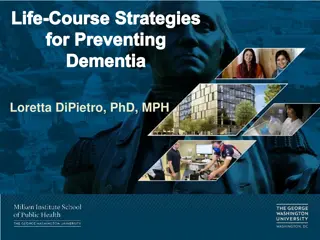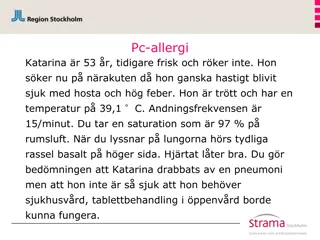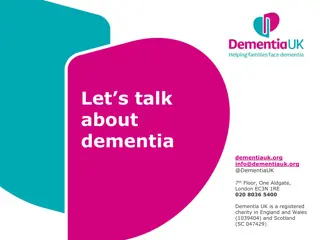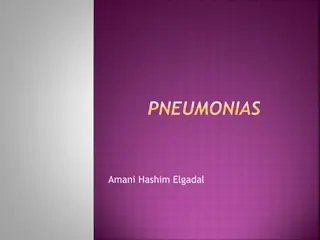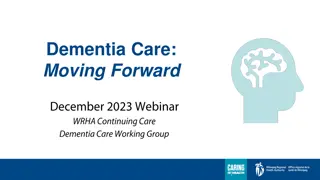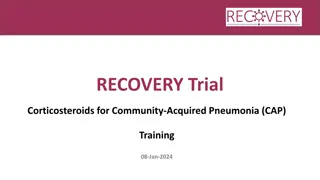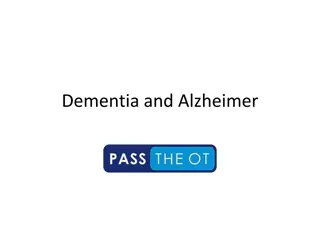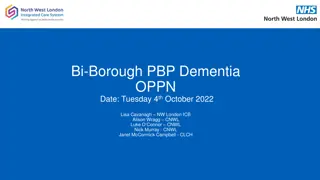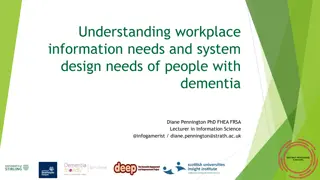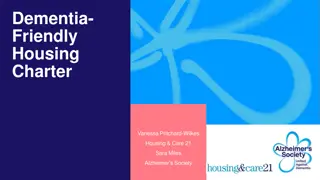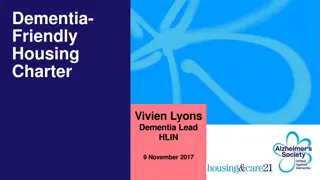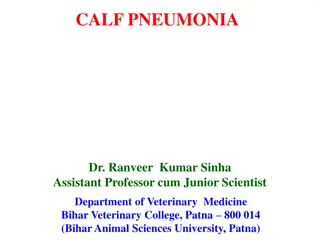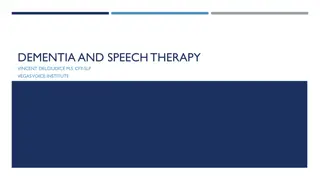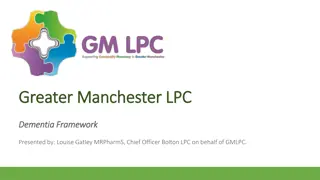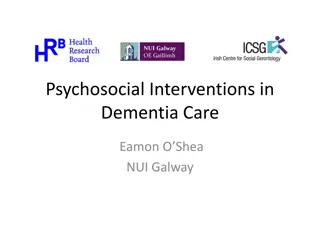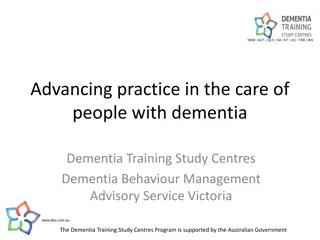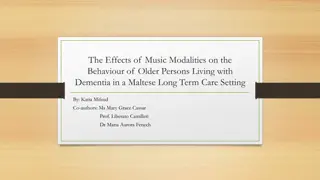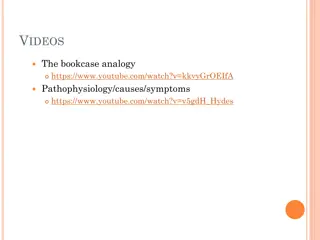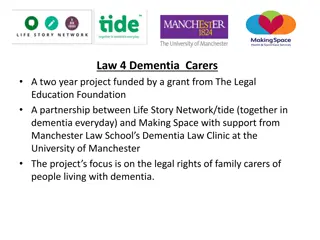Treatment of Pneumonia in Advanced Dementia
Features of advanced dementia include profound memory deficit, speech limitations, total functional dependence, incontinence, and inability to ambulate. Pneumonia in elderly individuals presents as an acute illness with cough, fever, dyspnea, and new focal chest signs. Mortality in pneumonia is high, especially in advanced dementia patients. Different classifications of pneumonia exist, such as CAP, HAP, VAP, HCAP, and AP. HCAP is associated with hospitalization, nursing home residency, chronic hemodialysis, wound care, and exposure to drug-resistant pathogens. Risk factors for MDR pathogen infections and guidelines for pneumonia management are crucial in combating this condition.
Download Presentation

Please find below an Image/Link to download the presentation.
The content on the website is provided AS IS for your information and personal use only. It may not be sold, licensed, or shared on other websites without obtaining consent from the author.If you encounter any issues during the download, it is possible that the publisher has removed the file from their server.
You are allowed to download the files provided on this website for personal or commercial use, subject to the condition that they are used lawfully. All files are the property of their respective owners.
The content on the website is provided AS IS for your information and personal use only. It may not be sold, licensed, or shared on other websites without obtaining consent from the author.
E N D
Presentation Transcript
TREATMENT OF PNEUMONIA IN ADVANCED DEMENTIA Sophie Allepaerts CHU- Li ge Belgium
Advanced dementia: features Profound memory deficit Speech limited Total functional dependance Incontinence Inability to ambulate Mitchell SL et al. Alzheimer Dis Assoc Disord 2006 Lost interest to eating Dysphagia High mortality rate Susan L et al. N Engl J Med 2009 Last 6 months to 2 years 90 % require a nursing home
Pneumonia In elderly Acute illness with cough + at least: Cough may be absent Fever may be absent or new focal chest signs fever > 4 days dyspnea /tachypnea without obvious cause lower than young Chest difficult to obtain and to interpret + chest radiography: new lung shadowing Changed mental status Woodhead M et al. Clin Micobiol Infect 2011
Mortality in pneumonia 5th cause of death > 65 years old 6 month mortality in advanced dementia : 50 % - 74 % 1 st cause refer of hospital transfert from nursing home El-Sohl et al. CID 2004 Foley NC et al. Dement Geriatr Cogn Disord. 2014
Classification of pneumonia Community Acquired Pneumonia (CAP) Hospital Acquired Pneumonia or nosocomial pneumonia (HAP) Ventiled acquired pneumonia (VAP) Health Care Associated Pneumonia (HCAP) Aspiration pneumonia (AP)
Health Care Associated Pneumonia (HCAP) Hospitalization in the preceding 90 days reside in a nursing home or an extended care facility treated with chronic hemodialysis Receive home wound care Exposed to a family member with a drug- resistant pathogen infection Higher frequencies of multidrug-resistant (MDR) pathogens Anthony X et al. Lung 2013
Risk factor for infection with multi- drug-resistant (MDR) pathogens Guidelines for the management of adults with hospital-acquired, ventilator- associated, and healthcare- associated pneumonia. Am J Respir Crit Care Med 2005
Pathogens identified in HCAP: evolution of the literature HCAP 2005 HCAP 2013 S Aureus: 26-48 % Enterobacteriaceace: 12-32 % S. pneumonia: 10-27 % P. Aeruginosa: 10-19 % Methicillin-resistant S. aureus (MRSA): 26.5 % Pseudomonas Aeruginosa: 25.3 % Haemophilus species: 5,8 % Streptococcus pneumonia: 3,1 % Anthony X et a.Lung 2013 Kollef MH et al.Chest 2005
Management for HCAP for resident in nursing home Guidelines for the management of adults with hospital-acquired, ventilator- associated, and healthcare- associated pneumonia. Am J Respir Crit Care Med 2005; 171 : 388 416
Side effects of antimicrobials Method of administration Adverse drug reaction Clostridium difficile infections Renal failure Drugs interaction Neurotixicity Multidrugs resistant organisms Oral treatment behavioral disorder swallowing disorder IV treatment phl bitis IM treatment pain Restraints Disconfort Iatrogenic desease
Potential impact of antibiotic use in advanced dementia Antibiotic use can prolonge life Dying process Can lead confort ? Fluid intake? Jenny T. et al . JAMDA 2012 Givens et al. Arch Intern Med 2010 Steen JT et al . J Am Med Dir Assoc 10.1016
No treatment or treatment For Against Pneumonia is a potentially treatable disease High mortality rate of pneumonia Adverses effects of antimicrobial are frequent Advanced dementia = terminal illness In absence of clear advanced directives: cure In presence of clear advanced directives: comfort
Prevention of pneumonia Influenza vaccination Hospitalization death from influenza and from other causes. Pneumococcal vaccination morbidity and mortality in nursing home resident Oral health Redue incidence of aspiration pneumonia of 40 % cough reflex sensitivity Woodhead M et al. Clin Micobiol Infect 2011 Mendel G et al. mandell textbook of infectious disease 2009 Wantando et al. Chest.2004
Conclusions Pneumonia is frequent and serious illness Diagnosis is difficult Prevention with vaccination is efficient Administration of the treatment remains difficult Specific directive treat or confort treatment should decided, tailored to each individual and clinical situation
Conclusions Pneumonia is frequent in advanced dementia Pneumonia diagnosis is difficult Mortality rate is high Prevention with vaccination is efficient Administration of the treatment remain difficult Specific directive treat or confort treatment should decided, tailored to each individual and clinical situation
